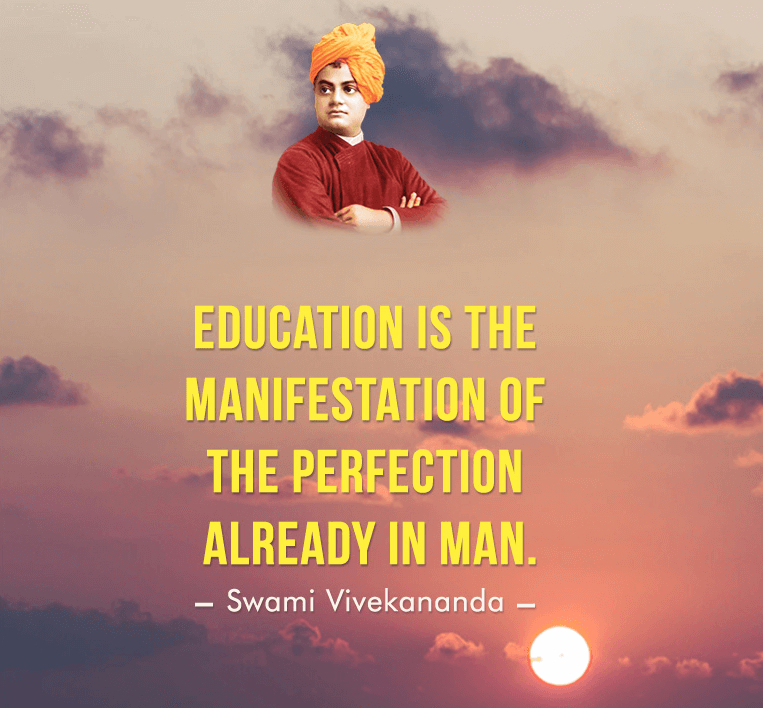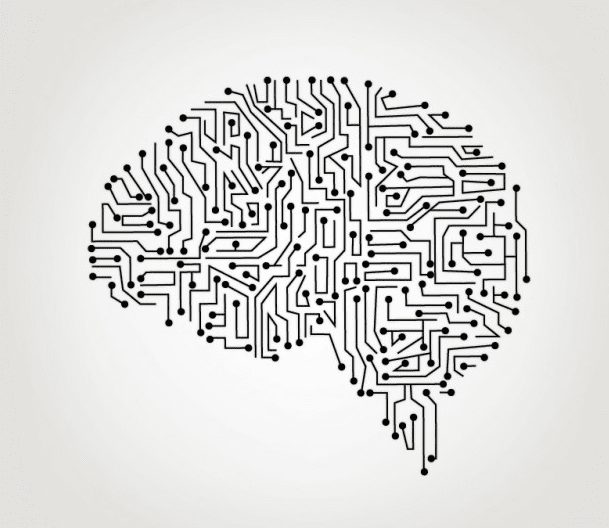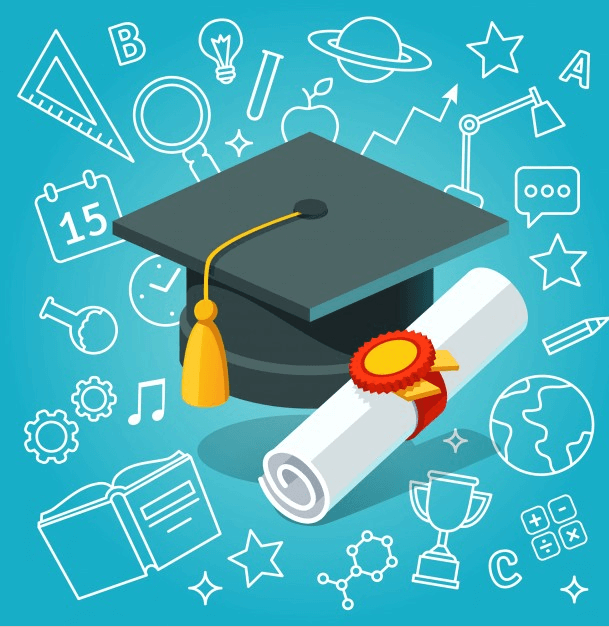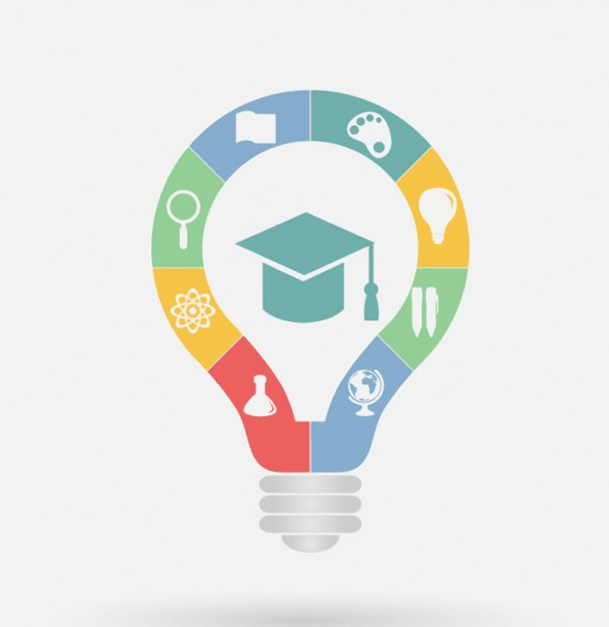The objective of education is to make way for better and fuller development of the individual, not only in relation to Society and Mankind but in relation to the Divine Manifestation. This has been described aptly in Sanskrit.
'आत्मनो मोक्षाय जगद हिताय च ।'
Education is for the salvation of the individual and the happiness of the world. Thus, fuller development of the individual in relation to the world around and the Divinity appears to be the supreme objective of education. Other objectives such as teaching art, gaining the ability to earn a livelihood, learning the use of leisure, or any of the other preoccupations of education are secondary. Swami Vivekananda has said, “Education is the manifestation of perfection already in man, and religion is the manifestation of more and more Divinity by making the man more and more perfect.”

The second objective of education is to awaken, in the minds of the pupils, a consciousness concerning the society and nation in which one lives and consciousness concerning the whole of humanity. Education should lead to a better understanding of our nation's problems in relation to problems of the world. This is to be achieved through the teaching o different academic subjects and, independently, by studying the problems themselves. The study of Physics, Chemistry, Mathematics, Languages Social Sciences, etc. is not important in and by itself; such study is to be the instrument of a change leading to the greater development of the national group and then of mankind. There is a saying in Jnana Prabodhini, 'We neither teach Maths, nor English, nor History, but we teach the pupils, and we encourage them to learn about the central problems facing India through Sciences, Humanities and Social Sciences.' This study is not to be a dry study that never plucks the strings of the emotions in one's heart. This study does not mean stuffing the head with more and more information. This study is to be accompanied by emotional overtone which will impel a person to proceed in the direction of the right solution to the problems.

The present school curriculum in general caters to only a few aspects of an individual's personality. The whole school, college, and university curriculum and the examination system, emphasize memory more than anything else. Memory is just one part of education. In Jnana Prabodhini, it is said that there are ten mental operations, not necessarily exclusive of one another. However, they can be treated independently. They are :
The first seven mental operations according to Dr. Guilford, the American Psycholoist. They are
There are also 4 areas of behavior. They are
Further, there are six types of products viz.

According to Dr. Guilford, the interaction of mental operations into areas and products give way to 5 x 4 x 6 = 120 factors of intelligence.
The objective of education should be the development of 120 factors of intelligence as enunciated by Jnana Prabodhini the 10 mental operations working in different areas yielding different products.
It is a well-known fact that our schools and colleges harp on, at the most 3 mental operations and 3 areas and, even if we feel that they do care for all the products, the maximum number of factors of intelligence attended to is 3 x 3 x 6 = 54. In practice, however, the number of factors attended to is still much less. Thus our schools are not able to care for the whole intellectual aspect of the student. They take care of only a very small part of intellectual development.

However, human development does not mean the development of intelligence alone. The balanced development of the body is also very important. One of the objectives of education ought to be, to work for healthy growth of the body, which means not only muscles and outward physique but also bones, physical resistance, ability to suffer stress and strain, and real radiant health and strength.
Along with the development of the body, education should give importance to the development of character traits, The emotional nature of a pupil is to be very carefully nurtured and developed. This emotional content is able to merge Man in Eternal Bliss, Ananda, which is one of the three attributes of Parabrahma, - the other two being Sat ( Existence) and Chit (motion and consciousness). So one of the most important objectives of education is to develop the character traits or emotional nature or qualities of heart which, in Sanskrit, are called.
चारित्र्यगुण, भावनाकोष, हदयगुण
The development of a person is still not complete, even with the development of body, intellect, and heart. Any such complete development becomes possible only when a person is motivated from within. Whether the motivation arises from some very crude stimulus to the ordinary senses. Viz. The idea of avoiding pain or getting pleasure, avoiding censure or winning praise, or the stimulus to higher ideas like reaching lofty heights, serving one's own family, society, the nation, or humanity by trying to understand and become one with Divinity, all these are aspects of motivation. Thus, no action is possible without motivation. If all the intellectual and physical development does not lead to any action, that development is sterile.
This four-sided growth of the individual – the physical, the intellectual, the emotional, and the motivational is very carefully pursued at Jnana Prabodhini. Proper care is taken to throw challenges at the students, so as to encourage them to think creatively, solve problems and problematic situations, understand persons and situations, and make decisions. Attempts are made to introduce these elements into the everyday teaching and examinations.
Two periods per week are reserved when every student from the lower grade to the upper grade has to undertake some project, either in physical or social sciences or in humanities. He has to identify a problem, he has to study it, carry out investigations, find a solution, test the results, and finally write a report. Emphasis is laid on self-study methods, learning to learn by oneself. Emphasis is also laid on the ability to ask questions, give answers, raise doubts, accept challenges, express oneself by spoken word or written word, by prose and poetry, by art and drama. The students should learn how to do things neatly and thoroughly, how to be elegant and objective, how to read fast and think fast.
Jnana Prabodhini does not believe in the static concept of intelligence. According to this concept, one cannot better his or her intelligence got at the time of birth. It might at the most become rusted on account of disuse. Jnana Prabodhini firmly believes that every human being can better his intelligence and or physique and/or qualities of heart by efforts and practice.
It firmly believes that the people of India and indeed the whole of humanity can be transformed into a higher species of mankind, higher in respect of every positive human quality, by constant efforts. And this is one of the fundamental principles of education.

The physical development and development of character traits and motivation are attempted in the work of the evening activity. The boys of Jnana Prabodhini Prashala are divided into various groups according to their age. The evening activity is an exercise that nourishes the body, the heart, and the urge to serve an ideal.
If education is the total growth of an individual and of groups of individuals, then it is obvious that the school alone cannot be held responsible for the success or failure in attaining the needed development. Even before school, the parents and the home are responsible for both the early and also the later education of their children. The evening activity or activities in a youth organization constitute the third institution which is responsible for a very important part of education. Fourthly, the church of the organized religious, training, along with environmental social influence, such as the realities of the social and economic structure, newspapers, literature, movies, T.V., other mass media, and the social and political movements of the day taken together form the fourth institution which is responsible for the education of the student. In pre-independent India, a galaxy of great men arose who fought and died for the freedom of the country. It was not the school that threw up this galaxy of eminent men, but it was the religious, social, and political movements and youth organizations of that period which wielded such tremendous influence on their young minds.

The usual school is responsible mainly for academic studies. Nearly 80% of its work should pertain to the development of intelligence and the teaching of academic subjects, 20% of its work should be directed to the development of other factors of personality, which include the body, the heart, and the love for the ideal. The evening activity, or the youth organization, should direct nearly 80% of its effort towards the development of body, heart, and perception of the ideal and 20% of its efforts should be spent in improving the academic studies and in the building up of good relations at home.
The institution of the home should cohere with both the school and the youth organization. It should not throw cold water on whatever is being done at the school and during the evening activity. It should not either create distrust of these two nor should it kindle displeasure in the minds of pupils by too much insistence of compulsion that he or she must comply 200% with the school and the youth organizations. It appears, paradoxically, that even a little stimulated resistance on the part of the guardians is sometimes more useful! All of this ultimately depends upon the given situation, the quality of the school that is attended by the students, the quality of the peer-group that is found by them at the evening activity, and the influence that is exercised upon them by the society at large including the Government. All these factors should be taken into consideration and wise parents should guide their wards in such a way as to facilitate the growth of total personality and not merely academic personality.